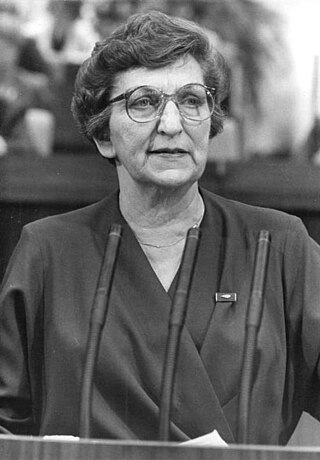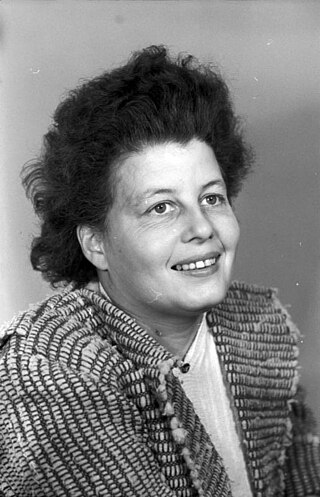
Emmy Damerius-Koenen was an East German politician. She was married to Helmut Damerius from 1922 to 1927 and later, was married to Wilhelm Koenen. She was a member of the Communist Party of Germany and spent most of the Nazi era outside Germany, in the Soviet Union and other countries. She returned to Germany in December 1945, where she was active in East German women's organizations.

Ilse Thiele was an East German politician. She was a member of the powerful Central Committee of the country's ruling SED (party) between 1954 and 1989. She served as the Chair of the national Democratic Women's League from 1953 till 1989.

Edith Baumann was a German politician. She was a co-founder and official of the Free German Youth, the youth organisation that after 1946 became the youth wing of East Germany's ruling Socialist Unity Party . Between 1946 and her death she was a member of the country's powerful Party Central Committee.
Hilde Neumann was a German lawyer.
Lieselotte Thoms-Heinrich was a journalist and officially mandated feminist. Between 1968 and 1981 she was editor in chief of the mass circulation women's magazine, "Für Dich". She was also a member of the national parliament ("Volkskammer") between 1963 and 1981.

Roberta Gropper was a German Communist political activist who became a member of the Reichstag in 1930. In 1934 she fled to the Soviet Union where she fell victim to party factionalism and spent more than three years in a concentration camp: this was followed by a Siberian exile. She was able to return to Berlin in 1947 and became a mainstream politician in the German Democratic Republic .
Paula Rueß was a German political activist (KPD). Forced into exile by the Nazi takeover, during the early 1940s she worked with the French Resistance.
Emmi Dölling was a Czechoslovak/German political activist (KPD/SED) and journalist.

Anne-Marie Durand-Wever was a German gynaecologist and co-founder of Pro Familia, the German branch of the International Planned Parenthood Federation.
Charlotte Hohmann was the first editor in chief of Die Frau von heute, the mass circulation weekly women's magazine founded in 1946 in Germany's Soviet occupation zone, into which, after 1949, rival publications were absorbed. As a young woman she was a political activist (KPD). Unlike her brother, she survived the Nazi years, but she nevertheless underwent several Gestapo interrogation sessions. During the early 1950s she held various senior positions within the East German print media sector even, at least on paper, after her retirement in 1955.
Käthe Dahlem was a German political activist who, after being forced into exile, became an anti-fascist Resistance activist, participating in the Spanish Civil War and, subsequently, again based in France. After 1945 she became a public official in the Soviet occupation zone. She was retired on health grounds in July 1949 and was subsequently caught up in her husband's difficulties with the ruling party, the party first secretary, Walter Ulbricht and other leading party comrades who had spent the war years in Moscow. By the 1960s, however, the authorities were happy to honour her pre-war and wartime contribution.

Friedel Apelt was a German political activist, trades union official and politician (KPD/SED). During the Nazi years she participated actively in anti-fascist resistance, and spent much of the time in prison or as a concentration camp internee. After the war she was able to resume her political career in the Soviet occupation zone.
Helga Mucke-Wittbrodt was a German physician. For nearly forty years she was the medical director at the East German Government Hospital. In connection with this, for forty years she was a member of the National legislature, representing not a political party but the Democratic Women's League. Although her medical abilities were evidently well attested, the length of her tenure at the hospital and the number of national honours that she accumulated over the years indicate that she was also highly prized by the authorities for her discretion and "political reliability".
Luise Dornemann was a women's rights activist-politician and, in her later years, a writer.

Ilse Rodenberg was a Hamburg typist who became an actress and, later, an influential East German theatre director. She combined this with a political career, sitting as a member of the East German parliament for four decades between 1950 and 1990. She was a member not of the ruling SED (party) but of the National Democratic Party of Germany, one of the smaller Block Parties which contributed a semblance of pluralism to the country's political structure.

Maria Rentmeister was a German Women's and cultural policy maker - who became an anti-government resistance activist after 1933. She spent much of the time during the twelve Nazi years abroad or, later, in state detention. In 1945 she relocated to what now became the Soviet occupation zone where she became the first General Secretary of the politically important Democratic Women's League .

Elli Paula Schmidt was a German communist political activist with links to Moscow, where as a young woman she spent most of the war years. She returned in 1945 to what later became the German Democratic Republic where she pursued a successful political career till her fall from grace: that came as part of a wider clear out of comrades critical of the national leadership in the aftermath of the 1953 uprising. She was formally rehabilitated on 29 July 1956, but never returned to mainstream politics.

Katharina "Käthe" Kern became a German anti-government activist during the Hitler years. After 1945 she quickly emerged as a senior politician and party loyalist in the Soviet occupation zone. She served between 1946 and 1985 as a member of what became the powerful Party Central Committee. A long-standing leading figure in the Ministry for the Health Service), she also served, between 1949 and 1970, as head of the national "Mother and Child department".

Eva Rohmann was a German politician who was chairwoman of the Democratic Women's League of Germany from 1989 until 1990, during the last year of East Germany's existence, and a member of the Volkskammer (1981–1990).













